#and who has one of the biggest parties in the parliament
Explore tagged Tumblr posts
Text
Trying to explain what the fuck just happened in Lankan politics today.
The leftist party has won 159 seats out of 218 in the Parliamentary elections. The single biggest landslide win since we broke from the British and achieved universal franchise in 1948.
Any party achieving a super majority in the executive and legislative is, objectively speaking, bad. It disables checks and balances, which is a catastrophic thing for any democracy, and the only two other times it's happened for us has irrevocably eroded the fabric of civic rights and democratic freedom. Also, the reason the NPP won the North and East is that the colonized, genocided and subjugated people there have no faith in electoralism anymore. The way this government has engaged minority issues has been utterly abysmal and now they've been rewarded for it.
On the other hand:
The winners. Are all. Grassroots. Candidates.¹
We have voted out every single career criminal that's been barnacled into the Lankan political arena since before I've been alive. The fascist party has only three seats.² The other fascists didn't win a single seat. The neoliberal legacy party won none. There are only forty people in Parliament that represent any sort of dynastic political legacy. After 76 solid years of nothing but political dynasties.
This is barely five years after the Rajapaksas swept in and absolutely glutted the Parliament with their family members and cronies end to end.
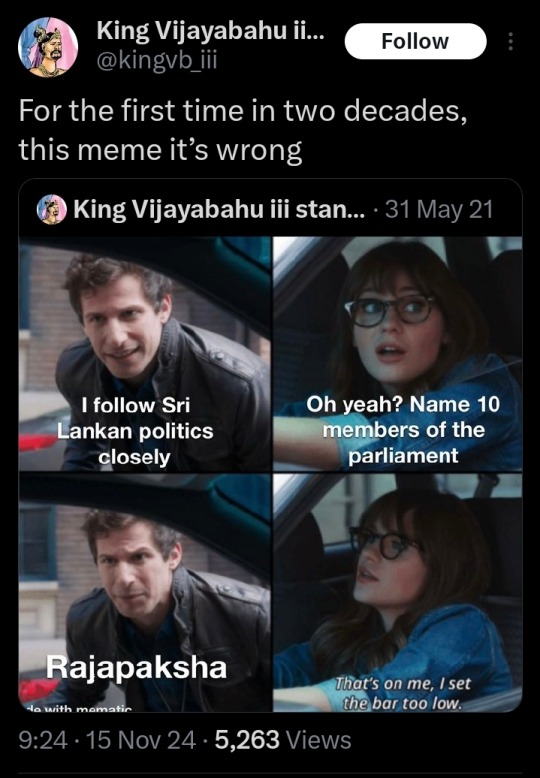
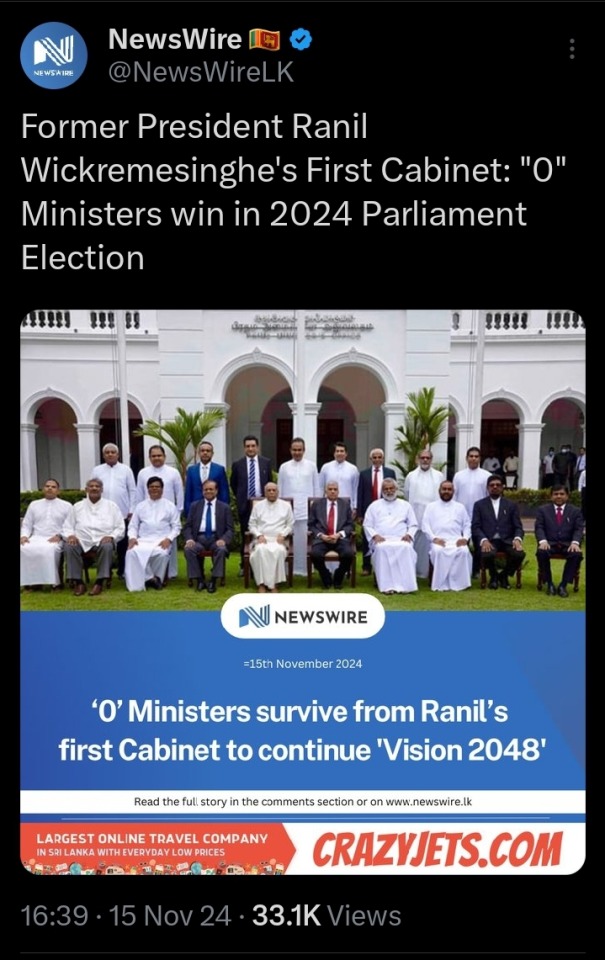
This is the illegitimate interim government we had for most of the last 18 months. We literally, physically, chased the Rajapaksas out of the country and this fucking demon set up a puppet government just so he could finally sit in that goddamn chair and be the despot he'd always dreamed of in exchange for letting them all come back. He's now gone. His entire circle is gone.
THEY ARE ALL FUCKING GONE.
In US terms, just imagine that, five years from now, when Trump's GOP has control of everything, the entire GOP and the worst of the Dems are all purged from Congress and Senate, the Green Party in control of all three branches of government under a pro-union left-wing President and an unmarried female LGBT rights activist Vice President, and the Dems reduced to barely 20% of the House.
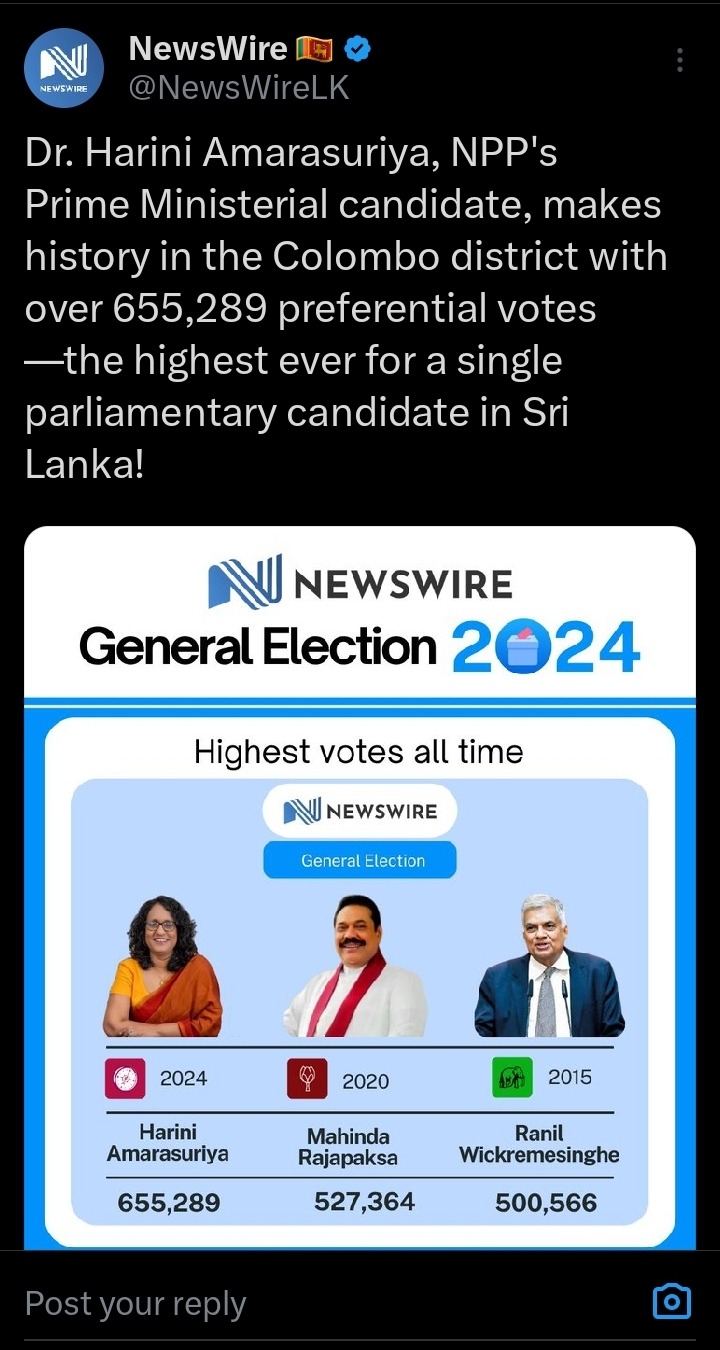
This is my anthropology professor. She joined politics from the small nascent leftist coalition to help keep the government accountable. She's now the Prime Minister and the most popular Parliamentary candidate in the nation's history. (Edit: She was knocked off first place by a dude in the final result. Boo.)
(On the other hand— the woman who helped make me a radical anarchist and literally helped write a book on political dissent and resistance...now is the state. Uh.)
But there are so many women in Parliament! We had the lowest female representation in a South Asian Parliament and some of them were from the list of seats reserved for parties rather than elected ones. Most were either anti-feminist conservative embarrassments, widows and daughters of elite politicians and neoliberal shills. It's still only an increase of a few percentage points (Edit: from the previous 5% to 10% in the final result!) but now we have elected academics, feminist advocates, activists! There Is a representative for Malaiyaha Tamils in the Central Province for the first time in history and it's a young woman! (Edit: now it's two female Malaiyaha MPS!!) This is the plantation community that still live in conditions closest to the slavery the British forced upon them two hundred years ago!
I'm like. Completely mindfucked. To be very very clear, the NPP coalition formed around the nucleus of the JVP that used to be communist but haven't been in 30 years, they're now just social democrats who are left of places like the US and UK, whose "left" is now center-right. They're only threatening to the Western mainstream media for some reason who can't stop bleating about how we have a "Marxist" government now. In reality, the actual chances for radical reform are still quite low, and the opportunity for further erosion is quite high with a super majority government regardless of affiliation.
On the other hand:
What the fuck.
Sometimes living through historical events is really damn amazing.
---
¹ Well, nearly. There are a few career politicians and a nepo baby but they aren't so bad either.
² Goddamn it, Baby Rajapaksa and Sri Lanka's answer to JD Vance have wormed their way in using the list of Constitutionally reserved party seats for non-elected members. FUCK the National List.
#five years ago i was working a news desk watching a band of violent ethnofascists known for genocide torture kidnappings and murder sweep in#and take control of the entire country#on the heels of the worst terrorist attack we've suffered that they orchestrated for this purpose#wondering how many of our colleagues would be safe#and watching the people that opposed them flee the country#i cannot tell you the enraging hopeless terror#and now#they're all gone#THEY'RE FUCKING GONE#sri lanka politics#sri lanka news#sri lanka protests#sri lankan parliamentary elections#sri lanka election 2024#anura kumara dissanayake#harini amarasuriya#feminism#leftism#world news#faith in humanity#power to the people#aragalaya#knee of huss#අරගලයට ජය!#අරගලයට ජය
3K notes
·
View notes
Text
Indian Prime Minister Narendra Modi is, by some measures, the most popular leader in the world. Prior to the 2024 election, his Bharatiya Janata Party (BJP) held an outright majority in the Lok Sabha (India’s Parliament) — one that was widely projected to grow after the vote count. The party regularly boasted that it would win 400 Lok Sabha seats, easily enough to amend India’s constitution along the party's preferred Hindu nationalist lines.
But when the results were announced on Tuesday, the BJP held just 240 seats. They not only underperformed expectations, they actually lost their parliamentary majority. While Modi will remain prime minister, he will do so at the helm of a coalition government — meaning that he will depend on other parties to stay in office, making it harder to continue his ongoing assault on Indian democracy.
So what happened? Why did Indian voters deal a devastating blow to a prime minister who, by all measures, they mostly seem to like?
India is a massive country — the most populous in the world — and one of the most diverse, making its internal politics exceedingly complicated. A definitive assessment of the election would require granular data on voter breakdown across caste, class, linguistic, religious, age, and gender divides. At present, those numbers don’t exist in sufficient detail.
But after looking at the information that is available and speaking with several leading experts on Indian politics, there are at least three conclusions that I’m comfortable drawing.
First, voters punished Modi for putting his Hindu nationalist agenda ahead of fixing India’s unequal economy. Second, Indian voters had some real concerns about the decline of liberal democracy under BJP rule. Third, the opposition parties waged a smart campaign that took advantage of Modi’s vulnerabilities on the economy and democracy.
Understanding these factors isn’t just important for Indians. The country’s election has some universal lessons for how to beat a would-be authoritarian — ones that Americans especially might want to heed heading into its election in November.
-via Vox, June 7, 2024. Article continues below.
A new (and unequal) economy
Modi’s biggest and most surprising losses came in India’s two most populous states: Uttar Pradesh in the north and Maharashtra in the west. Both states had previously been BJP strongholds — places where the party’s core tactic of pitting the Hindu majority against the Muslim minority had seemingly cemented Hindu support for Modi and his allies.
One prominent Indian analyst, Yogendra Yadav, saw the cracks in advance. Swimming against the tide of Indian media, he correctly predicted that the BJP would fall short of a governing majority.
Traveling through the country, but especially rural Uttar Pradesh, he prophesied “the return of normal politics”: that Indian voters were no longer held spellbound by Modi’s charismatic nationalist appeals and were instead starting to worry about the way politics was affecting their lives.
Yadav’s conclusions derived in no small part from hearing voters’ concerns about the economy. The issue wasn’t GDP growth — India’s is the fastest-growing economy in the world — but rather the distribution of growth’s fruits. While some of Modi’s top allies struck it rich, many ordinary Indians suffered. Nearly half of all Indians between 20 and 24 are unemployed; Indian farmers have repeatedly protested Modi policies that they felt hurt their livelihoods.
“Everyone was talking about price rise, unemployment, the state of public services, the plight of farmers, [and] the struggles of labor,” Yadav wrote...
“We know for sure that Modi’s strongman image and brassy self-confidence were not as popular with voters as the BJP assumed,” says Sadanand Dhume, a senior fellow at the American Enterprise Institute who studies India.
The lesson here isn’t that the pocketbook concerns trump identity-based appeals everywhere; recent evidence in wealthier democracies suggests the opposite is true. Rather, it’s that even entrenched reputations of populist leaders are not unshakeable. When they make errors, even some time ago, it’s possible to get voters to remember these mistakes and prioritize them over whatever culture war the populist is peddling at the moment.
Liberalism strikes back
The Indian constitution is a liberal document: It guarantees equality of all citizens and enshrines measures designed to enshrine said equality into law. The signature goal of Modi’s time in power has been to rip this liberal edifice down and replace it with a Hindu nationalist model that pushes non-Hindus to the social margins. In pursuit of this agenda, the BJP has concentrated power in Modi’s hands and undermined key pillars of Indian democracy (like a free press and independent judiciary).
Prior to the election, there was a sense that Indian voters either didn’t much care about the assault on liberal democracy or mostly agreed with it. But the BJP’s surprising underperformance suggests otherwise.
The Hindu, a leading Indian newspaper, published an essential post-election data analysis breaking down what we know about the results. One of the more striking findings is that the opposition parties surged in parliamentary seats reserved for members of “scheduled castes” — the legal term for Dalits, the lowest caste grouping in the Hindu hierarchy.
Caste has long been an essential cleavage in Indian politics, with Dalits typically favoring the left-wing Congress party over the BJP (long seen as an upper-caste party). Under Modi, the BJP had seemingly tamped down on the salience of class by elevating all Hindus — including Dalits — over Muslims. Yet now it’s looking like Dalits were flocking back to Congress and its allies. Why?
According to experts, Dalit voters feared the consequences of a BJP landslide. If Modi’s party achieved its 400-seat target, they’d have more than enough votes to amend India’s constitution. Since the constitution contains several protections designed to promote Dalit equality — including a first-in-the-world affirmative action system — that seemed like a serious threat to the community. It seems, at least based on preliminary data, that they voted accordingly.
The Dalit vote is but one example of the ways in which Modi’s brazen willingness to assail Indian institutions likely alienated voters.
Uttar Pradesh (UP), India’s largest and most electorally important state, was the site of a major BJP anti-Muslim campaign. It unofficially kicked off its campaign in the UP city of Ayodhya earlier this year, during a ceremony celebrating one of Modi’s crowning achievements: the construction of a Hindu temple on the site of a former mosque that had been torn down by Hindu nationalists in 1992.
Yet not only did the BJP lose UP, it specifically lost the constituency — the city of Faizabad — in which the Ayodhya temple is located. It’s as direct an electoral rebuke to BJP ideology as one can imagine.
In Maharashtra, the second largest state, the BJP made a tactical alliance with a local politician, Ajit Pawar, facing serious corruption charges. Voters seemingly punished Modi’s party for turning a blind eye to Pawar’s offenses against the public trust. Across the country, Muslim voters turned out for the opposition to defend their rights against Modi’s attacks.
The global lesson here is clear: Even popular authoritarians can overreach.
By turning “400 seats” into a campaign slogan, an all-but-open signal that he intended to remake the Indian state in his illiberal image, Modi practically rang an alarm bell for constituencies worried about the consequences. So they turned out to stop him en masse.
The BJP’s electoral underperformance is, in no small part, the direct result of their leader’s zealotry going too far.
Return of the Gandhis?
Of course, Modi’s mistakes might not have mattered had his rivals failed to capitalize. The Indian opposition, however, was far more effective than most observers anticipated.
Perhaps most importantly, the many opposition parties coordinated with each other. Forming a united bloc called INDIA (Indian National Developmental Inclusive Alliance), they worked to make sure they weren’t stealing votes from each other in critical constituencies, positioning INDIA coalition candidates to win straight fights against BJP rivals.
The leading party in the opposition bloc — Congress — was also more put together than people thought. Its most prominent leader, Rahul Gandhi, was widely dismissed as a dilettante nepo baby: a pale imitation of his father Rajiv and grandmother Indira, both former Congress prime ministers. Now his critics are rethinking things.
“I owe Rahul Gandhi an apology because I seriously underestimated him,” says Manjari Miller, a senior fellow at the Council on Foreign Relations.
Miller singled out Gandhi’s yatras (marches) across India as a particularly canny tactic. These physically grueling voyages across the length and breadth of India showed that he wasn’t just a privileged son of Indian political royalty, but a politician willing to take risks and meet ordinary Indians where they were. During the yatras, he would meet directly with voters from marginalized groups and rail against Modi’s politics of hate.
“The persona he’s developed — as somebody kind, caring, inclusive, [and] resolute in the face of bullying — has really worked and captured the imagination of younger India,” says Suryanarayan. “If you’ve spent any time on Instagram Reels, [you’ll see] an entire generation now waking up to Rahul Gandhi’s very appealing videos.”
This, too, has a lesson for the rest of the world: Tactical innovation from the opposition matters even in an unfair electoral context.
There is no doubt that, in the past 10 years, the BJP stacked the political deck against its opponents. They consolidated control over large chunks of the national media, changed campaign finance law to favor themselves, suborned the famously independent Indian Electoral Commission, and even intimidated the Supreme Court into letting them get away with it.
The opposition, though, managed to find ways to compete even under unfair circumstances. Strategic coordination between them helped consolidate resources and ameliorate the BJP cash advantage. Direct voter outreach like the yatra helped circumvent BJP dominance in the national media.
To be clear, the opposition still did not win a majority. Modi will have a third term in office, likely thanks in large part to the ways he rigged the system in his favor.
Yet there is no doubt that the opposition deserves to celebrate. Modi’s power has been constrained and the myth of his invincibility wounded, perhaps mortally. Indian voters, like those in Brazil and Poland before them, have dealt a major blow to their homegrown authoritarian faction.
And that is something worth celebrating.
-via Vox, June 7, 2024.
#india#narendra modi#pm modi#modi#bjp#lok sabha elections#rahul gandhi#democracy#2024 elections#authoritarianism#anti authoritarian#good news#hope
732 notes
·
View notes
Text
ok only one person asked for this, but I'm really bored, so: memes about our government collapsing, here you go. feel free to ignore it otherwise, next post will be about more harbingers xD
But politics talk beyond this point- dw, I get it if you dont wanna see that
Context will be below the pictures- please keep in mind that german humor is...well, german. Also, I can't figure out how to post multiple pictures at once, so uh...this is gonna be a long one. ALSO look at the ALT text I tried my best to translate & give more context
















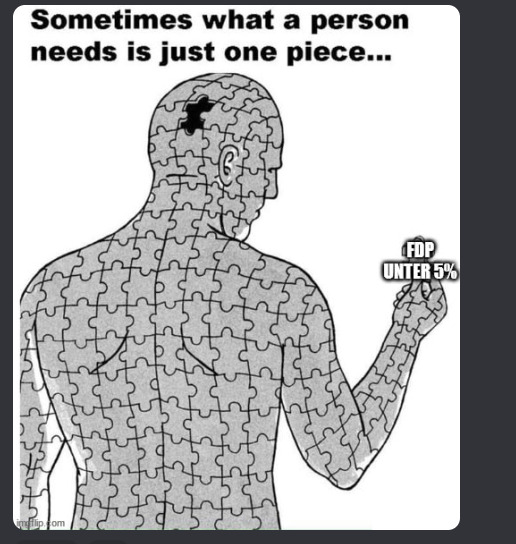







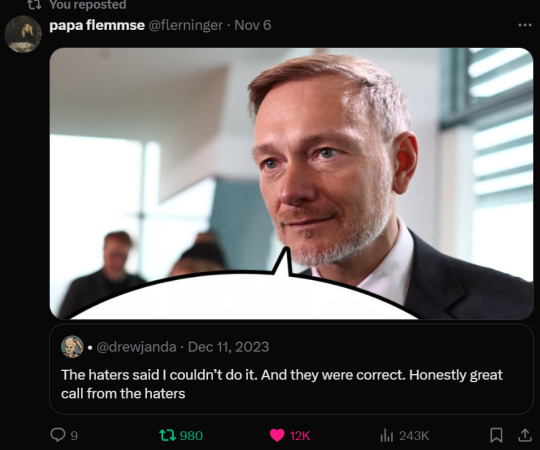




So of course, everyone immediately started memeing about Lindner. Why? Because most of the country fucking hates the guy. I don't think I specified enough how awful he is. The current government is incredibly inneficient, and he's a major reason why. He's an ultra-capitalist, in love with a free market economy, frequently has temper tantrums in parliament, and is INCREDIBLY anti social. He wants higher pension ages, less subsidies for unemployed people, the works. What people are also making fun off is Scholz, our chancellor, who was practically nonexistent for the last 3 years, only to deliver a VICIOUS speech about how awful Lindner is. So yeah! Government collapse is fun if you have the right memes. Hope at least some of those were funny to you guys as well
thaaats most of the ones I could fit. Which brings me to: the context. oh my god where do i begin.
Okay, so, the german parliament is made out of multiple parties, right? When we have elections, the chancellor is from the party with the most votes, but they don't rule alone, because they need a majority (<50%), and we have so many parties that they don't get there. So, they have to form coalitions with the other parties. When they do that, the leaders of the other parties get to be in high positions as well. Every party that isn't in the coalition is the opposition.
More often than not, we have what is called a Grand Coalition- the two biggest parties, CDU and SPD. However, in our last elections (which was also the first time in 16 years that our chancellor changed), this did not happen. We instead got the so called traffic light coalition, made up of the SPD (winner, got the Chancellor), FDP (our other main protagonist in this story) and the Greens.
So, they've ruled for about 3 years now, and it's been an utter shitshow- because of multiple factors, of course, but one of the major ones was the FDP. See, the Greens and the SPD are (or, well, were, but thats for another story) more left leaning, ESPECIALLY on stuff like climate change, while the FDP are mostly focused on the economy. So, there's been lots of conflicts, and all the parties in the coalition, but especially the FDP, have lost immense support. The FDP to a point where they might not get ANY seats in parliament for the next election.
Now, some of our current biggest issues are inflation, climate change, and the war in Ukraine. I'm simplifying this to hell and back, but essentially, we have a so called debt-brake in our constitution, which means that the country cannot go over a certain amount of money. Sounds good, right? Well, not entirely. Right now, we are trying to go over this limit. See, the debt-brake has an intentional loophole, which says that in emergencies, you CAN go over it, like natural catastrophes (e.g. COVID).
Germany, right now, wants to fund our infrastrcuture, our military, Ukraine, and social subsidies. For this purpose, the SPD and Greens agreed to go over the limit. Except they can't, without the approval of their coalition partner, the FDP, and their finance minister, Lindner, who RUNS the FDP. They've been fighting about this for A WHILE, and yesterday, Scholz (the chancellor), gave Lindner an ultimatum: allow them to go over the limit, or get fired. Lindner asked for snap-elections instead, did not accept the proposal (which was already heavily in his favour) and got fired.
Which wouldn't be a problem is he was any common minister- but he's a coalition partner, so the coalition broke apart- and without the FDP, the SPD and the Greens alone do not hold a majority in parliament.
What this boils down to, is that we will likely have a minority-government (who will have BIG difficulties passing any laws) until January, and at the start of January, the Chancellor will call for a vote of confidence (yes, like in star wars), which he will lose. Meaning: Snap Elections in March (at the latest), less time for the parties to prepare their candidates, and MASSIVE profts for the right wing parties, which are currently leading in the polls.
#germany#ampelregierung#ampelkoalition#memes#german stuff#ampel aus#neuwahlen#christian lindner#olaf Scholz#fdp#robert habeck
105 notes
·
View notes
Note
i love the incorrect quotes, but i dont agree with your political views. if its not much, could you explain why ur so anti bjp?(thats what i assume anyway)
You know, I actually think that the memes and the quotes are sort of a natural extension of our political views. I'll explain but it might get a little long. Stay with me here.
Firstly, I want to say that I think this way of perceiving politics is so fundamentally wrong.
"Anti-BJP", "Pro-BJP", "Anti-Congress", "pro-congress" etc etc. This isn't a cricket match where you're rooting for your favourite team. Politicians, as a general rule, are a bunch of liars. They lie to gain power and control. It's OUR duty, as CITIZENS, to keep them accountable and in their lane so they actually do their goddamn jobs. That's how the democracy is supposed to work. If they don't do their job properly, you vote them out of the seat. They work for us, and not the other way around.
In India, we grow up with this idea of not questioning your elders. Papa ne keh diya, bas keh diya. As children our natural instinct of curiosity and inquisitiveness is stifled. We go to schools and the same pattern follows. Don't question the authority. Keep your head down and colour inside the lines. We internalise this lesson to colossal degrees. Is it any wonder that we all struggle with critical thinking? If you're spoonfed "the correct answer" your entire life, you never learn to find if what you were told is correct or not. This exact thing is used by all politicians across the entire political spectrum. They use our learned behaviour of deferring to authority and never questioning power against us. The leader of the country becomes the patriarch. Papa ne keh diya, bas keh diya.
I have various issues with various political parties in India, in fact. I have no love lost for any of them. I don't exactly believe in unconditional loyalty to politicians.
Since you brought up the BJP, let's talk about that. My biggest issue with them is their politics of communal hatred. All they keep yapping about is hindu-muslim this and hindu-muslim that. For what? They could spend their time talking about actual issues but the low-hanging fruit of stoking communal hatred is easier to grab onto. Remember when the British did the same thing? It was bad then and it's bad now. All this unrest just to get votes. Imagine fucking up the mind of an entire nation like this and then demanding to be praised for it.
Their foundational roots are from the RSS and that entire organisation's existence is just insane to me. It's even more insane that they managed to go from a fringe ideology to becoming mainstream. "Hindu rashtra", it seems. Who even wants that? WHY do they want that? Is it such a bad fate to live in peace and harmony with other religions? A lot of their talking points are about how much they hate the islamic nations and how those are horrible and then they want to turn around and do the same thing?!? Is the hypocrisy not clear? So what if other countries are religious states? Why can't we try to be different? Maybe I'M the stupid one for thinking all humans are the same that we should treat everyone the same. Who knows.
There are also a bunch of other issues that the BJP has racked up during their rule. The demonetisation disaster, mismanagement of government funds to create public infrastructure, letting the interests of billionaire business ruin PROTECTED FOREST AREAS for mining coal that they didn't even need, introducing and passing HORRIBLE bills through the parliament without any thought or discussion, literally ignoring the plight of people dying in riots, CORRUPTION, destroying the public sector and letting for-profit capitalists free reign in a country which has practically no proper labour laws, aiding in creating a historical record of INCOME INEQUALITY that is higher than it was during the fucking colonial era, fucking up the press even more somehow to the point where they control all of the media houses.
This is not even scratching the surface. I could keep going.
My issue is not whether people vote for the BJP or not. Even if you like the BJP, my issue is that people seem willing to turn a blind eye to all the issues with the government and not even hold them accountable for it.
Vote for whoever you want. My only request is to keep your government accountable. Keep the power in check. The politicians should be SCARED of the citizens fury if they do something wrong. They shouldn't be free to do whatever and get off scot free.
That's our political stance, really. It's Pro-Exercise-Your-Democratic-Rights-As-Citizen.
We will always encourage others to be wary of people with too much power.
Now coming back to why I said the memes reflect our political stance, it's because it's obvious to see why we happen to be willing to risk being a little critical of a literary text. You have to be a little transgressive, in a sense. Perfect obedience and perfect reverence stifles people from engaging with something to their full potential.
I'm sorry to say that if you enjoy the memes and the quotes, you are also being a little transgressive like us. You're also questioning the authority of a religion to an extent. Perhaps our political leanings aren't as different as you might believe.
-Mod S
72 notes
·
View notes
Text
Europe’s center of political gravity is veering to the right.
Center-right and far-right parties are set to take the largest number of seats in Sunday’s European Union election in the most populous nations: Germany, France, Italy, Spain and Poland.
France led the rightward lurch with such a crushing victory for the far-right National Rally that liberal President Emmanuel Macron dissolved France’s parliament and called an early election. Early results suggested the National Rally would win some 32 percent of the vote, more than twice that of the president’s party.
“The president of the Republic cannot remain deaf to the message sent this evening by the people of France,” National Rally’s President Jordan Bardella told his supporters at the Parc Floral in Paris.
In Germany, the center-right is cruising to a comfortable victory, with the far-right Alternative for Germany (AfD) coming second and beating Chancellor Olaf Scholz’s Socialists into third place.
Voters across 27 nations have voted over the past week to select 720 members of the European Parliament, who will serve over the next five years. Their first main role with be to approve or reject the main candidate for Europe’s top job: president of the European Commission.
In a Continent that has sought to exorcise the ghosts of fascism for eight decades, the scale of the presence of far-right will be one of the hottest topics of conversation.
Even though they are highly unlikely to be able to coordinate as a unified group inside the European Parliament — thanks to divisions on topics such as Russia — they will still be able to influence the overall direction of the EU, on everything from immigration to climate policies.
Collected together, the radical right parties would theoretically represent the second biggest bloc in the Parliament — being on track to come first in France and Italy, and second in Germany, the three biggest and most important countries in the 27-nation bloc. In Italy, Giorgia Meloni’s right-wing party secured the most support, projected to be about 28 percent.
The far-right is also expected to win in Hungary, and picked up five more seats in the Netherlands. The center-right was comfortably first in Greece and Bulgaria.
The single most ominous warning signal for the future of the EU is France, given the scale of the far right’s win over Macron. All eyes will now be on whether France’s populist wave can maintain its momentum through the impending parliamentary elections and on to presidential elections in 2027 — where a victory for far-right leader Marine Le Pen would threaten to throw the whole EU into turmoil.
The official winner of the evening looks set to be European Commission President Ursula von der Leyen whose center-right European People’s Party will still make up the single-biggest bloc in Parliament.
With early projections showing the EPP will secure about 181 out of the 720 seats in Parliament, the center right will be the dominant force but can hardly govern alone as it will be miles from an absolute majority in the chamber.
The main challenge for von der Leyen in the coming days and weeks will be whether she can strike a deal with the traditional centrist parties — the socialists and liberals — to build a majority of 361 or more in the Parliament.
“Today is a good day for [the] EPP. We won the European elections, my friends. We are the strongest party, we are the anchor of stability … Together with others we will build a bastion against the extremes from the left and from the right. We will stop them!”
Her supporters replied with chants of “Five more years.”
In all, the three big center groups look set to have just over 400 seats. That means von der Leyen’s reapproval will go down to the wire, because she will be rejected if only about 10 percent of lawmakers from the main parties rebel against their party lines. The rebellion rate is normally higher.
This raises a big question of whether she will need to fish around for other allies, ranging from the Greens to Italian Prime Minister Giorgia Meloni’s right-wing Brothers of Italy.
Von der Leyen’s center-right is quick to reject the xenophobia and euroskepticism of the far right, but it knows its voters share the same concerns on the cost of living, migration and a sense that Europe’s traditional core businesses — manufacturing and farming — are being strangled by green regulation.
Staking out its ground in the culture war over the EU’s identity, the EPP opened its EU election manifesto with its commitment to Europe’s “Judeo-Christian roots.”


47 notes
·
View notes
Text
Some blog that turned reblogs off (7 July 2024):
dear USAmericans, VOTING WORKS!!! French people showed up, French people voted, turnout was higher today than it has been since 1997, and we kicked the far right to 3rd place a week ago, the far right was the biggest party in France, we were slated for a far right parliament, prime minister, and government this week, we voted against them en masse and we won! VOTING WORKS! you’re up next in November! it’s very rare we get to say this, but this one time, take example on the French! show up and vote! because VOTING WORKS!
My reblog (8 July):
All these pessimistic people in the comments are like “My choices are being kicked in the face or death, which aren’t choices at all therefore I refuse to participate.” Nobody’s saying the choices aren’t shitty, but I think I’d rather be kicked in the face than die. Also, you all seem to think that you not voting will send a message to the democrats. It does send a message, but not the one you’re hoping for. It sends the message that young people don’t vote, so why bother listening to them. If you never show up to the polls, then your opinions don’t matter. Also, be honest with yourself. Are those of you who are sitting out from voting actually doing anything else to help the situation? Are you in protests and demonstrations? Are you calling in your representatives and voicing your opinions about how you hate your choices? 99% of you are not. If you can’t get your ass out of the fucking chair and wait in line for a bit just because your choices aren’t perfect then fuck you. You are the reason Trump will win again.
Today's "reblog" (6 nov):
So now that the election is over, are you guys happy with yourselves? Are you still proud of your refusal to participate?
Less people voted in 2024 than they did in 2020. Even trump had less people voting for him this year compared to 2020.
Boy, the 15 million of you who decided the system wasn't worth participating in sure showed us.
Fuck you.
20 notes
·
View notes
Text
youtube
Sorry France, but the biggest political event of the week will take place on Thursday in the UK. At the very least, it will herald a change in the right direction.
John Oliver outdid himself in the vid posted above . No spoilers from me! But please watch through the end. 😁
The last third of the vid describes how absolutely abominable the Conservative Party reign of the past 14 years has been. Most people in the UK already know this but outside the country the international community may not understand the full extent of the Tory rot.
Brexit, austerity, and tax breaks for the filthy rich did not bring prosperity to the UK. The US and the EU countries are currently doing better economically than Britain under the Tories. And the NHS (National Health Service) is verging on collapse with malnutrition spreading in the country. Easily preventable diseases like rickets and scurvy (fucking SCURVY!) have reappeared. As an aside, this is where America is headed if Republicans are returned to power in the US.
When COVID-19 struck the UK, the country had an inept leader who downplayed it and made matters even worse. Sound familiar? The already severely stressed NHS was barely able to cope while Boris Johnson and his powerful friends held parties in violation of pandemic regulations.
ABC Australia, BTW a top notch public broadcaster, describes the horrific mess the Conservatives created for Britain's NHS.
Britain's beloved NHS was kneecapped by the Conservative Party. Then the COVID pandemic hit
Yes, Labour's Sir Keir Starmer may be as boring as John describes. But do you really want somebody flamboyant and unintentionally entertaining like Boris Johnson just for the sake of amusement?
Sir Keir should be viewed as the captain of a competent team rather than as a fantasy superhero who will singlehandedly save the country. The Labour shadow cabinet has several members who have been described as progressive realists. David Lammy, Rachel Reeves, and Jonathan Reynolds are three shadow ministers who strike me as visionary and talented. Labour has ditched neoliberalism and regards fairness as a policy goal.
One way or another, Britain will begin to get relief by next weekend. Though the worse the defeat is for the Conservatives, the greater the public repudiation for the past 14 years of misrule. So every vote in every constituency is essential.
In addition to giving Labour a big majority, it would be nice to see the Liberal Democrats pushing the Conservatives down into third place in Parliament. That's more than just symbolic because the Lib Dems would then become the official opposition and the Tory successor to Sunak the Wet would be more limited with regard to power in Parliament – including number of questions allowed at the weekly Prime Minister's Question Time.
#uk#uk general election#british politics#john oliver#the conservative party#tories#rishi sunak#sunak the wet#nhs#austerity#brexit#david cameron#liz truss#teresa may#boris johnson#covid-19#partygate#labour#keir starmer#lib dems#ed davey#vote!
39 notes
·
View notes
Text
After 14 years in power, the Conservatives were punished at the polls for all the tumult that occurred on their watch: Brexit, which most Britons now regret; Johnson’s Partygate scandal, in which the then-prime minister threw parties while the country was under COVID-19 lockdown and lied about them; and the disastrous 2022 budget of Johnson’s successor Liz Truss, which sent shockwaves through financial markets. Britain now has more children in poverty than any other wealthy country, according to the United Nations. Without London, it’s poorer than Mississippi.
For the Conservatives [...] it was the worst defeat in their party’s nearly 200-year history.
The environmentalist Green Party had its most successful election night ever, winning a record four seats
And the far-right, anti-immigrant Reform UK Party will enter Parliament for the first time, with four seats — among them, one for its leader, Brexiteer Nigel Farage, who ran and lost seven times previously.
In Scotland, the once-hegemonic Scottish National Party — which has lobbied for Scottish independence from Britain — was decimated, with Labour taking most of the SNP’s seats.
In Northern Ireland, which is part of the U.K, the nationalist Sinn Fein party — which wants Northern Ireland to gain independence from Britain and join the Republic of Ireland to its south — won the most seats, becoming the region’s biggest party in the U.K. Parliament.
#uk politics#uk#britain#ireland#scotland#england#vote damnit#thank you to the brits for voting#hopefully my fellow americans#will join me in following your example
23 notes
·
View notes
Text
in case you've missed it, and I'm assuming most of you have, we're having a presidential election here in Finland. First round is currently going on, so I thought I'd give you a quick run down of our candidates!
(in alphabetical order, party in parentheses)
Mika Aaltola (independent): Has mainly worked in academia and apparently has experience in international politics, which is good for the job. I honestly know next to nothing about this dude, but he seems to positively radiate Just Some Guy energy. What would be interesting about him winning: I have no idea. Chances of winning: Ehhh - but it wouldn't be the first time we get a president from outside the daily politics.
Li Andersson (Left Alliance): current leader of the Left Alliance, former Minister of Education. What most people seem to say about her: "she's clearly the best choice, but has no chance of winning so I won't be voting for her." What would be interesting about her winning: first Left Alliance president Chances of winning: Unfortunately slim. Left Alliance is a small party and half of the country still seems to think they're Evil Communists.
Sari Essayah (Christian Democrats): she's also the leader of her party. Most known for being a former racewalker and religious. What would be interesting about her winning: How the hell did it happen??? Chances of winning: zero.
Pekka Haavisto (Green League): Former Minister of the Environment, International Development, and Foreign Affairs (three different terms, not all at once). He was born in 1958 and hasn't done much beyond politics. He's been in the presidential race twice already too, both times losing to our current president, Sauli Niinistö. What would be interesting about him winning: first gay president. Chances of winning: he made it to the final round twice already, so maybe third time's a charm? He has been polling first this time around.
Jussi Halla-aho (Finns Party): a prominent rightwing blogger, a Slavic linguist by education, and the current Speaker of the Parliament. He's "immigration critical" in the same vein "gender criticals" tend to be. He's is considered something of an intellectual in the rightwing circles despite having the vibes of an anthropomorphic raisin, and has amassed a cult following - who literally call him Mestari (master, but in Finnish the vibes are more a master of a trade and not some dude who spanks you in the bedroom. What would be interesting about him winning: finding out if I can immigrate to Denmark. Chances of winning: none if I can help it, but like I said, he does have a very solid fanbase.
Hjallis Harkimo (Movement Now): best known for being the owner of an ice-hockey team or something. His real name is Harry and for some reason he has been elected into the parliament twice. I assume it's the famous allure of a "successful businessman" or because he's something of a celebrity? Who knows. What would be interesting about him winning: How did it happen? Chances of winning: slim.
Olli Rehn (Centre Party): Served as the Minister of Economic Affairs for like a year under our most fuck-witted prime minister in recent history. Not much else to say about it. Somehow seems older than Pekka Haavisto tho he's actually younger. What would be interesting about him winning: absolutely nothing. He's so dull it's almost offensive. Chances of winning: who knows? Maybe he'll be a dark horse if all other candidates fall flat.
Alexander Stubb (National Coalition Party): Former Prime Minister, and former Minister of Finance. He's ehhhhhh not the worst possible option, honestly, and is on the more liberal side of the Rich Getting Richer party. What would be interesting about him winning: how will he be different from our current (National Coalition Party) president, I guess Chances of winning: last I checked, he was polling second, so I guess it's a possibility?
Jutta Urpilainen (Social Democratic Party): Former Minister of Finance. Social Democrats are one of the biggest parties we have, but they took a while deciding on who to pick. She's alright. Social Democrats are usually fine, and she'a long term Social Democrat. What would be interesting about her winning: uhh... possibly the first president to have released a Christmas album? Chances of winning: I just don't think she's that popular, to be honest. But she might make it into top three at least, like I said, it's one of the biggest parties behind her.
#finnish presidential elections#long post#political opinions#political onions#i wrote this and did not take my evening meds on time so if i don't sleep tonight this is why
45 notes
·
View notes
Text
The government is proposing to banish all remaining hereditary peers from the House of Lords in the biggest shake-up of parliament in a quarter century. The UK’s 92 remaining hereditary peers – who have inherited their titles from their parents – will lose their right to sit and vote in the upper chamber under proposals put forward by ministers on Thursday. The move would complete reforms first made by Tony Blair’s government, which revoked the 700-year-old right of all hereditary peers to sit in the Lords in 1999. Just 92 of them, elected from the whole group, were allowed to remain until an agreement could be reached to phase them out altogether. All 92 hereditary peers who now hold seats in the Lords are white men, and their average age is just under 70. They have continued to top up their numbers by holding byelections when one of them retires or dies. Campaigners have long called for the system to be overhauled. In its manifesto, Labour said the continued existence of hereditary peers was “indefensible”. The government’s bill will mean that there will no longer be any hereditary peers in the upper chamber. The earl marshal and the lord great chamberlain, who had been expected to keep their seats because of their ceremonial functions, will also be removed. The bill is likely to become law sometime next year, and will fulfil a Labour manifesto commitment. Nick Thomas-Symonds, minister for the constitution, said this was “a landmark reform”. “The hereditary principle in law-making has lasted for too long and is out of step with modern Britain,” he said. “The second chamber plays a vital role in our constitution and people should not be voting on our laws in parliament by an accident of birth.”
continue reading
It's a start, but certainly not enough. As long as the government choses who sits in the House of Lords it will be open to be used to reward party donors and other sycophants much like the last Tory government did, and Labour will do. Members of a second chamber should be chosen democratically.
17 notes
·
View notes
Text
UK politics talk under the cut
So last week, unless you have been keeping a close eye on this sad little island of mine for the past month, the labour party won a massive majority in parliament for the first time in over 20 years, albeit on a pathetically small 34% vote share (cheers FPTP system).

The big story behind this election however, is not centrist labour winning a "landslide" built on sand, or far-right snake-oil-salesman nigel farage's """party""" getting 5 seats, due in large part to getting large sums of money from fossil fuel donors to spend on astroturfing social media with botfarms, and almost daily coverage in MSM. No.
The real big story is, not only the centre-left Libdems winning way more seats for the first time in a decade (72), but the smaller left-leaning challengers, including but not limited to, Plaid Cymru and Green Party of England & Wales managing to make record breaking history by each winning 4 seats! The Green Party especially in particular came 2nd place to labour in 47 other seats!
Meanwhile 5 out of the 6 independent candidates that won, ran on a pro-Palestine platform.
All this, on top of the fact the Libdems, The Scottish National Party, and the rest of the smaller leftwing parties, all in favor of a ceasefire in gaza, including 50 returning labour MPs who who voted in favor of one last year, means that the House of Commons has a pretty hefty block of about roughly 154 MPs (yes, I did the math) who outnumber nobhead frogface and the dramatically shrunk cohort of tory MPs, and cannot be ignored by the pro-genocide wing of parliament.
While I'm glad that the tories have finally been knocked off their throne after 14 years of misery and turmoil, the biggest W from this entire election IMO, has to be the unwavering socialist champion for socioeconomic justice & world peace, Jeremy Corbyn, one of the indie candidates, winning his seat once again in Islington North.
The very fact these indies, PC and green MPs managed to score these historic Ws with very little resources, coverage, and even time considering how short this election campaign was, is a spectacular achievement for the british left.
There's still work to do yet and certainly no room for complacency, but overall, I don't think I've felt this cautiously optimistic about my political climate in a long while.
It also proves yet again that, despite the seemingly unsurmountable odds, the Palestine Solidarity movement's calls for a immediate ceasefire in Gaza are working, and it's not going away anytime soon, no matter who says otherwise.
#Personal Stuff#UK politics#UK GE 2024#UK General Election 2024#Good News for the Left#In this house we take whatever victories we can get#No matter how big or small#Free Palestine
10 notes
·
View notes
Text
A Polish man has pleaded not guilty to punching Denmark's prime minister, saying he was too drunk to remember the incident.
The suspect, who cannot be named because of legal restrictions, has gone on trial in the Danish capital, Copenhagen, charged with violence against a public servant, as well as several counts of indecent exposure and fraud relating to other incidents.
He has pleaded guilty to some of the other charges and could face a prison sentence and deportation.
PM Mette Frederiksen suffered minor neck and shoulder injuries as a result of the attack, which took place just three weeks after Slovak Prime Minister Robert Fico was seriously injured in an assassination attempt.
The 39-year-old Polish man told the court he had been having a bad day when he came face to face with Ms Frederiksen in Copenhagen in June, just two days before the European Parliament elections.
"I'm standing face to face with Mrs Prime Minister, [then] I can't remember anything else until I am arrested," he said, quoted by AFP news agency.
Ms Frederiksen, who was punched in the shoulder, was able to leave the scene unaided.
She said at the time she was "shaken" by the incident, but "fine".
The prime minister was taken to hospital for a check-up and then withdrew from the last day of campaigning for the European elections.
She will not be called as a witness in the trial.
But one of her bodyguards has testified, saying that the man came up to her on a busy street, said something incomprehensible to her and gave her "a hard punch with his fist on her shoulder".
Ms Frederiksen, 46, is leader of Denmark's Social Democrats, the biggest party in Denmark's coalition government.
She took office in 2019, making her the youngest prime minister in Danish history.
7 notes
·
View notes
Text
Angelique Chrisafis at The Guardian:
A leftwing alliance has become the biggest force in the French parliament after tactical voting held back the far right, but the shape of the future government remained uncertain after no group won an absolute majority. The surprise result for the leftwing New Popular Front – which won 182 seats, followed by president Emmanuel Macron’s centrist Together alliance on 163 and the far right in third with 143 seats – showed the strength of tactical voting against Marine Le Pen’s National Rally (RN). The far right and its allies had forged a commanding lead in the first round but were ultimately held back by massive tactical voting to prevent them winning enough seats to form a government.
Although the left alliance won the most seats, it was more than 100 seats short of an absolute majority. Amid a high turnout estimated at about 67%, no single group won an absolute majority of 289 seats and the ability to form a government. The parliament was likely to be divided into three blocs: the left, centrists and the far right. France now enters a period of unprecedented uncertainty over the shape of its future government and its likely prime minister. Macron has promised to remain as president, but he did not speak publicly on Sunday night, privately calling after exit polls were released for people to be “prudent” until the final results were clear on Monday morning. It could now take weeks to establish a government and it was unclear what shape that government could take with the Olympic Games due to begin in Paris in less than three weeks.
The prime minister, Gabriel Attal, announced that he would hand his resignation to president Macron on Monday morning. But he also said he could stay in place for the short term, if required, while a new government was formed. “Tonight, a new era begins,” he said, adding that France’s destiny would play out “more than ever in parliament”. Attal said: “I know that, in the light of tonight’s results, a lot of French people feel uncertainty about the future because no majority has emerged. Our country is in an unprecedented political situation and is preparing to welcome the world [at the Olympics] in a few weeks. I will stay in my role as long as duty requires.”
Jockeying for position in the new parliament began instantly. Jean-Luc Mélenchon, leader of the leftwing La France Insoumise party, said: “The president must invite the New Popular Front [left alliance] to govern.” The outgoing interior minister, Gérald Darmanin, said: “I note that today, no one can say they have won this legislative election, especially not Mr Mélenchon.”
Raphaël Glucksmann of Place Publique and the Socialist party, part of the left alliance, said: “We’re ahead, but we’re in a divided parliament … so we’re going to have to act like grownups. We’re going to have to talk, to discuss, to engage in dialogue.” Despite placing third, the results were historic for the RN – representing its biggest ever score in a parliamentary election, and an increase from the 88 seats it had when parliament was dissolved last month. But it was much lower than the party had expected after it topped the vote in the first round last week. Jordan Bardella, the RN president, said the parties who had teamed up to stop the far right were a “disgraceful alliance”. Le Pen, who intends to run for president for the far right in 2027, said the far right’s rise to power would continue. She said: “The tide is rising. It did not rise high enough this time, but it continues to rise and our victory has simply been deferred.”
In France, the far-right led by Jordan Bardella and Marine Le Pen have been dealt a big defeat, as the left and center wisely teamed up to prevent that from happening. The winner with the most seats will be the left-wing Nouveau Front populaire (New Popular Front) and Emmanuel Macron’s centrist Ensemble (Together) will be 2nd.
#2024 Elections#2024 French Elections#France#World News#Europe#Gabriel Attal#Emmanuel Macron#Marine Le Pen#Jordan Bardella#Raphaël Glucksmann#Jean Luc Mélenchon#Nouveau Front populaire#Ensemble#Union de l'extrême droite
8 notes
·
View notes
Text
O donkeys and dogs! Evil is Evil!!!
Lesser of Two Evils
Shāykh-al-Islām Ibn Taymîyyāh gives an example of the applicability of this principle he says if there is a Muslim living between the Mushrîks and they force him to do something from two then this is called duress (Ikrāh) [Minhāj Al-Sunnâh Al-Nabâwîyyāh vol.3 p995].
In other words the lesser of two evils is only activated when:
. You are under duress (life or death matter)
· You utter something whist you totally reject this action in your heart
The evidence and best example for this case was when Amār ibn Yāsîr (May Allāh pleased with him) had just witnessed the brutal murder of his mother Sumâyyâh (May Allāh pleased with her) (the first ever martyr of Islām) by the pagans of Qurāish because she refused to give up Islām. They then threatened to kill his father if Amār did not denounce Islām and come back to polytheism. Amār who had also been tortured during this time could not bare it any more he announced that he did not believe in Islām and Muhammad (PBUH) was not the Messenger of Allāh. Kuffār being Kuffār they still murdered his father Yāsir and Amār was released.
The two possibilities for Amār were:
· He does Shirk
· He does Kufr
Both Shirk and Kufr are evils but the lesser of the two in this compelling and life/death situation is the act of Kufr.
Wâhī(revelation) came down from the seven heavens to approve what Amār had done was the right thing and if he were to be put in that situation again he can utter words of Kufr as long as his heart was in a state of Mutmâ'înâh (full of Walā’ (loyalty) towards Islām and Barā’ (disapproval) to Kufr)
مَنْ كَفَرَ بِاللَّهِ مِنْ بَعْدِ إِيمَانِهِ إِلا مَنْ أُكْرِهَ وَقَلْبُهُ مُطْمَئِنٌّ بِالإيمَانِ وَلَكِنْ مَنْ شَرَحَ بِالْكُفْرِ صَدْرًا فَعَلَيْهِمْ غَضَبٌ مِنَ اللَّهِ وَلَهُمْ عَذَابٌ عَظِيمٌ
Whoever disbelieved in Allāh after he has believed, except him who has been compelled (forced) and whose heart is still firm in faith – but those who open their breasts to disbelief, on them is wrath from Allāh, and theirs will be a great torment [16: 106]
Shāykh-al-Islām Ibn Taymîyyâh sums up these principles by saying for anyone to know the best of the two goods and the biggest evil from the two evils one has to refer to the Wáhī (and this is a Shârt (condition)) otherwise we would be following our Hâwâ (desires) and this would cause chaos.
So we say to these donkeys and dogs:
By using this principle you acknowledge voting for manmade laws is evil. In Islām we have a principle that states evil will remain to be evil until the day of judgement and good will remain to be good until the day of judgement. So why is it that you are asking us to do evil when we are not under duress?
Every Muslim should know that voting for manmade laws i.e. in the general election (for any political party Respect, National, BJP, PDP, Labour,Independent) is like prostrating to an idol which is an act of polytheism (ShÎrk-fil-UlŪhiyyāh) that can lead to being an apostate (Mûrtâd). The reason being that when you vote for a Senator or Honourable you are delegating that Senator to go to parliament to decide what is good (Halāl) or bad (Harām). When Allāh has already decided for you what is Halāl and what is Harām.
إِنِ الْحُكْمُ إِلا لِلَّهِ
“Legislation (to make laws) belongs to none but Allāh” [12:40]
Ash-Shirk-fil-Ulūhîyyāh is done when you share the Sifāt (attributes) of Allāh with His creation and we know that Allāh forgives everything except shirk:
إِنَّ اللَّهَ لا يَغْفِرُ أَنْ يُشْرَكَ بِهِ
“Verily Allāh will not forgive those who assign partners to him…”
If committing Shirk is the lesser of two evils then what is the higher evil? When Allāh clearly states that the highest good is Tawhīd (Islāmic Monotheism) and the highest evil is Shirk. Is there anything more evil than Shirk? Shirk leads you to hellfire. Is there anything more dangerous than Hellfire?
These donkeys and dogs have said it is Wājib to vote and participate in the upcoming general elections. When it is well known that when anyone uses the principle of lesser than two evils then you can never derive Ahkām (Islāmic laws) from it i.e. its Mubāh, Fard, Wājib, Sunnâh rather it is referred to as being under duress. Amār was not obliged to denounce Islām because there are many examples where some of the Sahābâh who were under duress refused to denounce Islām when they had the permit to do so.
5 notes
·
View notes
Text
Indian Prime Minister Narendra Modi inaugurated the Ram temple in Ayodhya in the key northern state of Uttar Pradesh in January in hopes it would earn him a massive victory in the national election that concluded in June. That didn’t happen—at least not to the extent that Modi, his Hindu-nationalist Bharatiya Janata Party (BJP), and their ideological fountainhead Rashtriya Swayamsevak Sangh (RSS) expected.
In what has widely been described as a shock result, the BJP won merely 240 seats in the 543-seat parliament, after setting a target of 400 seats. Modi has formed a government but only with support from other parties.
Like any election result, the outcome had multiple causes that will take time to fully sort out. But one thing is already clear: Modi failed in his long-running bid to homogenize India’s Hindus across castes and cultures and consolidate their vote for his political benefit.
In 2014, Modi came to power on the back of religious nationalism and security issues, and he continued that trend in 2019. This year, in the absence of any urgent security threat from regional rival Pakistan and rising concerns over unemployment, inflation, and authoritarianism, Modi banked on the RSS’s homogenization strategy.
The Ram temple was built on a site long disputed with Muslims, where a 16th-century mosque stood until December 1992, when a group of Hindu nationalists razed it to the ground allegedly on the BJP’s provocation. Experts said the BJP had envisaged the temple would instill pride in Hindus, feed their Muslim animosity, and bring them under the Hindu umbrella to choose Modi.
Even though, by and large, the Hindu community seemed to have been pleased with the inauguration of the temple, that didn’t translate into votes for Modi across the Hindu hierarchy. Instead, the results exposed the weaknesses of the homogenization exercise.
Hartosh Singh Bal, an Indian journalist and the executive editor of the Caravan, said there is “diversity in Hinduism” and the election results prove that it can’t be “papered over by directing attention and hatred outwards” toward Muslims. This election proves that “Hindus are not a monolith” and that “various segments of Hinduism have a successful chance of taking on the BJP,” he added in reference to tactical voting by lower castes in Uttar Pradesh against the BJP.
Karthick Ram Manoharan, a political scientist at the National Law School of India University in Bengaluru, said that in Tamil Nadu, a state in southern India with the second-biggest economy in the country, the BJP did not win a single seat out of a total of 39.
“Hindus are the absolute majority in Tamil Nadu, but they still mostly vote for the secular Dravidian parties,” Manoharan said in reference to local parties that have emerged out of social movements opposed to an upper-caste Hindu order that the BJP and RSS have been long accused of nurturing and propagating.
In March, just a month before voting began, I witnessed saffron-colored flags expressing support for Modi’s party jutting out from rooftops and windows in tightly packed homes in western Uttar Pradesh. Some people I spoke to said that BJP workers had decided to adorn the neighborhoods as they pleased, but underneath the flag-waving, a large-scale discontent was brewing over a lack of employment opportunities.
The upper-caste youth seemed confused, if not yet disenchanted, with Modi and in the absence of industry and strong local economies once again mourned the loss of government jobs to affirmative action. (The Indian Constitution reserves almost half of all state jobs for people from lower castes and others who confront a generational disadvantage and historical discrimination.)
Meanwhile, Dalits, who sit at the bottom of India’s Hindu hierarchy, in hamlets nearby who depend on the quota for their dignity and livelihood were quietly recalibrating their options. The mood was starkly different from 2014 and 2019 when I visited some of the Dalit-dominated parliamentary seats in Uttar Pradesh. Back then, Dalits I met were upbeat and decisively pro-Modi. They said they supported him since they believed that he might raise their stature in the Hindu hierarchy.
But 10 years later, they suspected the BJP was plotting to weaken the constitution, the only assurance of rights for marginalized communities in a country where upper-caste Hindus continue to hold social capital and economic power.
Recent comments by BJP leaders that if Modi won 400 seats, he would change the constitution spread anxiety among lower castes that the party intended to scrap the reservation system. The BJP repeatedly denied this, but the suspicion that it is first a party for upper-caste Hindus is deep-rooted among lower castes, and experts believe the comments were part of the BJP’s political strategy.
“They were testing the waters to see what would be the reaction,” said Sushil Kumar Pandey, an assistant professor of history at Babasaheb Bhimrao Ambedkar University in Lucknow and the author of Caste and Politics in Democracy.
“The opposition picked it up and campaigned on it, telling people a change in the constitution could mean losing your livelihood, your jobs,” Pandey added. “That worked at a time [when] people were also scared of privatization” and in government-run sectors.
For Dalits, it was about more than jobs. The Indian Constitution is nearly worshipped by the community and celebrated en masse on the birth anniversary of the Indian intellectual who wrote it. B.R. Ambedkar was no fan of Ram and advocated against the caste discrimination inherent in Hinduism all his life, even converting to Buddhism when he felt there was no escaping caste-based prejudice. While he couldn’t annihilate the caste system, he ensured that the constitution offered lower castes a quota in government jobs to gradually uplift them.
In his honor, and as an ode to the progressive document, Dalits sing songs in praise of the constitution and hail it as the upholder of their dignity in a society where they continue to be belittled. Any change to the text was unacceptable. “Their cultural identity is linked to this book,” said Ravish Kumar, a journalist and the host of a popular YouTube news show.
In the south, too, there was a fear of culturally being subsumed by a Hindi-speaking upper-caste elite. Indian federal units, or states, were defined in the 1950s on the basis of language, and to this day south Indians identify themselves on the basis of the language they speak. The Ram temple had no resonance in the southern states, particularly in electorally significant Tamil Nadu, with the highest number of seats regionally. Tamils were wary that the RSS’s homogenization agenda would drown out their cultural ethos and impose a secondary status on the Tamil language.
Manoharan, the political scientist, said that in Tamil Nadu, it was “not so much religious but fear of cultural homogeneity” and “a language policy which will give importance to Hindi speakers over Tamil speakers and upper-caste Tamils over other backward castes.”
In a state where “88 percent people come from so-called lower castes” and “69 percent have jobs under affirmative action through a special act,” people were also extremely worried that the BJP may “water down” the employment quota promised in the constitution, Manoharan added.
The southern Indian states have a longer history of resistance to upper-caste domination, a higher literacy rate, better economies, and a tradition of secular politics. While the BJP maintained its tally of 29 seats from the last election, it is being seen as a poor result considering the inroads the RSS has made in the south.
For instance, in the southwestern state of Kerala, the RSS has more than 5,000 shakhas, or branches, second in number only to Uttar Pradesh, India’s most populous state—yet “despite the fact that the RSS has thousands of training grounds in Kerala, they are unable to get influence,” said K.M. Sajad Ibrahim, a professor of political science at University of Kerala. “That’s because while religion is important, communal harmony is more important to people here. BJP tries to create tensions, and that doesn’t work here.”
The BJP managed to gain one seat for the first time in Kerala, but that isn’t being attributed to its ideological success or expansion of homogenization project but to the winning candidate’s personal appeal. Suresh Gopi, the winning candidate, is a popular movie star.
In many states in the Hindi belt and even in the south, the BJP did well. The upper castes and urban voters are standing firmly behind Modi. Kumar, the journalist, said it would be foolhardy to dismiss Modi—and the bigger Hindutva, or Hindu nationalist, forces backing him—just yet. He said Hindutva hasn’t lost and only faced a setback. “The BJP was trying to dominate caste politics with Hindutva,” he said, “but the election result shows that dominance has cracked.” However, he added, “it has only cracked—the ideology still has wide-scale acceptance.”
Everyone else Foreign Policy spoke to concurred but added that Hindus are far too diverse to be homogenized. Manoharan said the results exposed the weakness of the homogenization agenda and its faulty premise. “Hindutva’s aim for homogeneity is confounded precisely by a structural feature of the religion-culture it seeks to defend—caste,” he said.
22 notes
·
View notes
Text
I thought I'd run the whole UK numbers before I go to sleep since that's easy to do and then farage shows up and brings up electoral reform so I guess I'm talking about him now since he brought up electoral reform too...
So the Gallagher index for this election is 22.7. This is abysmal. A Gallagher index measures how proportional an election is by doing some maths on the vote proportions and seat proportions (look it up if you want to see the equation). The closer to 0 the value, the more proportional the system. The larger the number the less proportional. It's generally agreed that a value of 5 or less is good for a proportional system.
I use another equation per seat to throw put a number between 1 and -1 which tells you how over/under represented a party is proportionally. A value close to 0 is best and in a proportional system you'd expect to see all the parties hovering just above or below 0. (I came up with this equation during the 2017 election and it turns out its actually a variation on the Saint-Laguë index equation but with the square taken out to keep the sign of the number and keep it between 1 and -1).
The point is that usually you get from taking the entire UK and seeing who's been over or under represented is that the wining party gets a moderate bump, the biggest loser gets a moderate hit, the national parties are significantly over-represented (this is because english votes are devalued due to english constituencies, on average, having more voters in them), and the small parties take a massive hit (lib dems in 2017: -0.75, greens in 2017: -0.91).
What's happened this election is Labour have a massive bump (0.77), all parties except for the northern ireland parties have taken a hit (this is because the constituencies in northern ireland have fewer voters, on average, than everywhere else in the country. Looking on a whole-UK level, the northern ireland winning parties will always have a value > 0). The biggest losers (except the independents... which you shouldn't really group for this kind of thing) are the SNP (-0.5) and, of course, reform (-0.96).
(bonus fact: the lib dems seem to manage to take the most proportional amount of seats in scotland quite often)
So yeah... looking at the numbers it seems to me that things need to change. And farage agrees (not someone I tend to agrees with. On anything.). So now I've got pause for thought. Farage is clearly plotting something he explicitly said he'd work with anyone on reform to the electoral system in his little speech the BBC decided to broadcast (where's the green's free space to say whatever?). Long-term we need electoral reform. We can't have many more elections like this. I full believe we're seeing the electoral system breaking down infront of our eyes. But what will take it's place?
I think the left will benefit most from most forms of electoral reform. Greens will get the representation they deserve and, with changes in voter behaviour, even improve their number of voters. There are more people voting left and centre-left than right so with any system that lets you rank or score your favourites would be beneficial. You can imagine that there's many people who have a first choice that's more left than how they actually vote due to the spoiler effect and tactical voting.
One form that I can see farage pushing for to capitalise on his massive under-representation in parliament is any system that only lets you vote for one party. This would be a system that just has top-up seats. If the seats were assigned by national vote proportion, then reform would have 93 seats. Labour on 219, conservatives on 154. You can see how this would force one of the large parties into going into coalition with reform. You can see this would be a problem.
Conclusion? Well at least electoral reform is entering the general political discourse... I'm all for electoral reform but now we know the reform party has their eyes on it (and that, for some reason, the general political discourse won't listen to (off the top of my head): the greens, the lib dems, and the labour party membership (not the leadership tho...), but stop and listen to reform), we should be really careful about what form it takes
9 notes
·
View notes